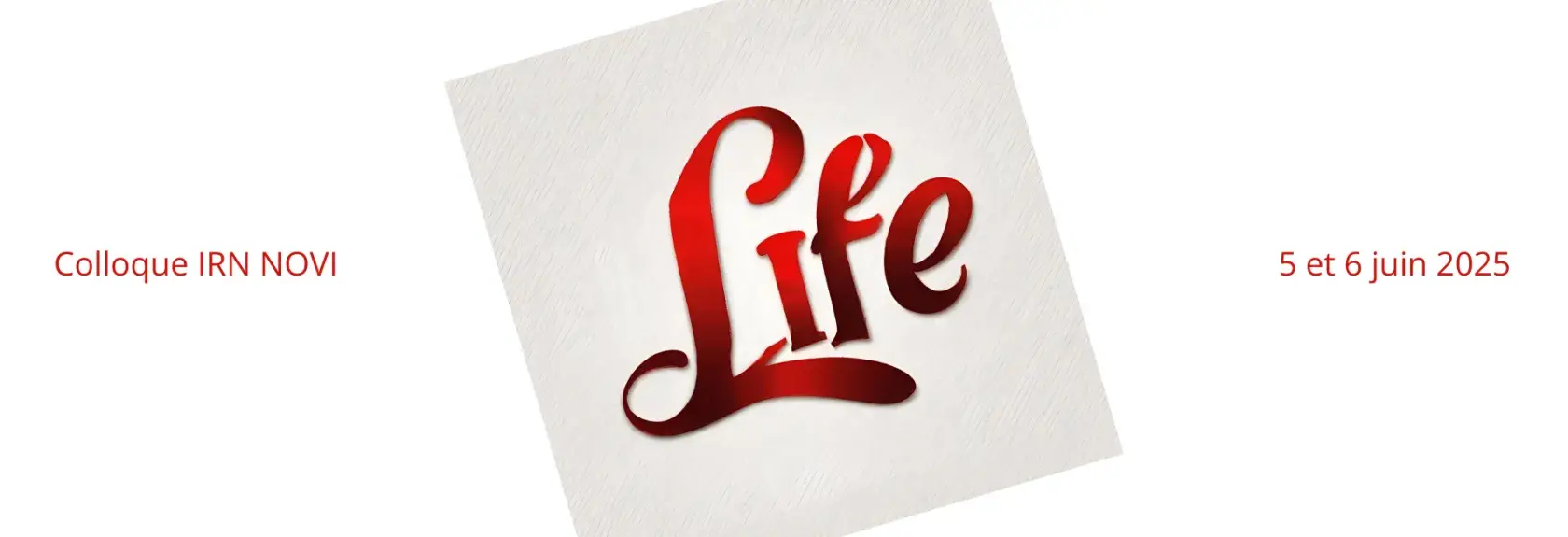
Ma Life
Program
Thursday, June 5
14h30 Welcome and introduction
Estelle Ferrarese, Sandra Laugier, Perig Pitrou
Session 1 Origins of Life and Individual lives.
Chair : Estelle Ferrarese (Université de Picardie, IUF)
- 14h45 Perig Pitrou (CNRS, Maison Française d’Oxford)
The origins of life as universal and subjective question - 15h30 Martin Eggen Mogseth (UIB)
« Reconception » - 16h15 Coffee break
- 16h30 Panel on Martin Hägglund’s This Life
Orazio Irrera, Perig Pitrou, Paola Marrati, Anne Gonon, Jeroen Gerrits and Martin Hägglund
Friday, June 6
9h30 – Welcome, coffee
Session 2 Getting a Life. Form of Life and Perfectionism.
Chair: Piergiorgio Donatelli (University Roma La Sapienza)
- 9h45 – Léa Boman (Paris 1 Panthéon Sorbonne)
“Getting a Life. The perfectionist transformation of the self through discontinuity" - 10h30 – Sandra Laugier (Paris 1 Panthéon Sorbonne)
« Getting a Life, Finding a Voice » - Break
- 11h30 – Orazio Irrera (Paris 8 Vincennes Saint-Denis)
« Getting a life. Moral and Political Ambivalences between the Care of the Self and the Care of the Others in the Genealogy of Salvation »
Session 3 One Life.
Chair: Sandra Laugier (Paris 1 Panthéon Sorbonne)
- 14h30 Anne Gonon (Doshisha University, Kyoto)
“Escaping a damaged life – My childhood written from Fukushima ” - 15h15 Jeroen Gerrits (Binghamton University, directeur d’études invité FMSH)
« Ma So-Called Life: Skepticism and the Ordinary in TV-series » - 16h Paola Marrati (Johns Hopkins University)
« Our singular, shared lives » - Break
- 17h Keynote
Veena Das (Johns Hopkins University)
हम हशमत' [We Hashmat]: the “we” in the “I” urf (or) Krishna Sobti’s literary multiple.
18h Cocktail
Salon Décanal, Université Paris 1 Panthéon-Sorbonne, 3e étage
Presentation
We start from a perplexity with the use of the current "franglais" expression "ma life" in French.
"Très usité par les personnes parlant franglais. Exemple : Je ne sais pas ce que je vais faire de ma life, mais une chose est sûre je ne vais pas la passer dans ce bled paumé. "When someone says "ma life" in French instead of the usual "ma vie", it is not only a mixture of common linguistic forms in a globalised world: it also reflects an attitude towards one's own life: distance, irony, ("je suis au bout de ma life").
This expression is a specific way of dealing with one's own life in the contemporary world. It implies a certain distance from one's own life, a life that is something narrated and still owned. The idea of having a life of one's own implies a tension between being the author, the guide of one's life, and a disconnection; a failure to fully own (live) one's life.
We wish to explore this tension through various edges: ordinary language philosophy (Wittgenstein, Cavell), Foucault and Subjectivation, Anthropology of Life (Veena Das’ Life and Words), Martin Hägglund's This Life: Secular Faith and Spiritual Freedom, which discusses what it means to invest in our everyday existence and how life is shaped by our finite commitments.
We thus can link the concept of 'ma life' to the ideas of “form of life”and the idea of something 'having a life of its own'.
To say "ma life" is to acknowledge that one's life, just like biological life, has a "life of its own", something that one inhabits but does not control.
From the point of view of an anthropology of life, “Ma Life” invites reflection on how ways of constructing individual lives can be linked to broader conceptions of 'life' as a general phenomenon (Strathern). What are the links between conceptions of the origins of life in the universe and ways of understanding the course of an individual life? How do the techniques - biotechnologies, ritual techniques or biographical techniques - invented by human societies contribute to the shaping of the subjective experience of life, of owning a life?
"Ma life" reflects a subjectivity that is both engaged in life and shielded from it, between acknowledgement and avoidance. Veena Das's concept of inhabiting a form of life and of alienation from one's own life raises the question of the norms of life in a new way:, Martin Hägglund's This Life imagines a secular and democratic faith dedicated to our finite life together. The conference aims to explore how we live within and resist the norms, origins, and forms of life that shape us.
Colloque international organisé par l'IRN NOVI (CNRS)
ISJPS UMR 8103 CNRS Paris 1 Panthéon-Sorbonne
PEPR Origins- WP « Social approach to origin »
Fondation Maison des sciences de l’homme
Informations pratiques
Université Paris 1 Panthéon-Sorbonne
Centre Panthéon
12 place du Panthéon, 75005 Paris
salle 6 (esc. M, 2e étage)
ATTENTION
À partir de 14h le 6 juin : amphithéâtre I
Inscription gratuite mais obligatoire (un formulaire par journée). À l'issue de l'inscription, un message de confirmation vous sera envoyé avec un billet PDF en pièce jointe. Ce billet, accompagné d'un document d'identité, est indispensable aux personnes extérieures à l'université Paris Panthéon-Sorbonne pour accéder à l'événement.
Registration is free but compulsory (one form per day). Once you have registered, a confirmation message will be sent to you with a PDF ticket attached. This ticket, together with an identity document, is essential for people from outside the Université Paris Panthéon-Sorbonne to gain access to the event.